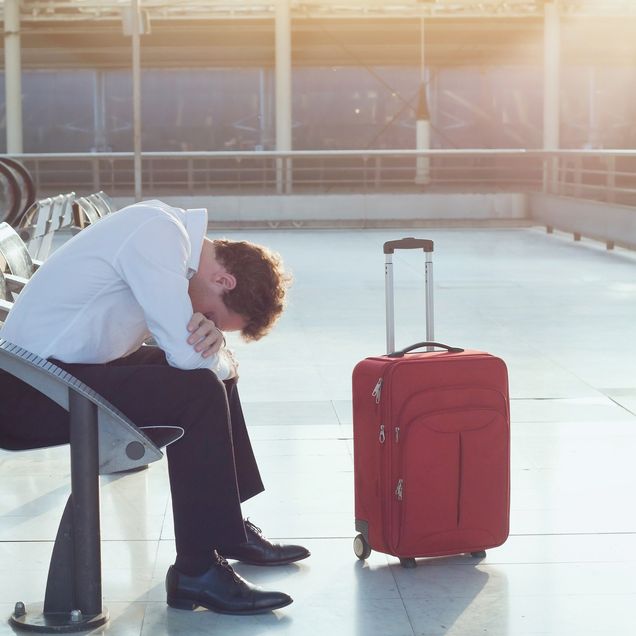Traveling to a far-away land? Don’t waste your trip fighting jet lag the whole time.
Here’s why you feel so crappy after a long flight: When you fly out of your time zone, you disrupt the sleep-wake schedule your body is used to functioning on, says Jamie Zeitzer, Ph.D., an assistant professor and researcher at Stanford University’s Center for Sleep Science and Medicine.
Related: The Men’s Health Better Man Project—2,476 Brilliant Life Hacks and Health Tricks
Researchers previously thought that it takes your internal body clock, or circadian rhythm, roughly 1 day to adapt per time zone you cross. (So if you fly from New York to Los Angeles, you’ll feel groggy for 3 days.)
But a new study in the journal Chaos finds that the average person’s circadian rhythm actually runs slightly longer than 24 hours.
This is bad news if you’re taking a long flight out east: It’s easier for your body to adjust to traveling west, since you’re lengthening your day, than traveling east and shortening your day.
In fact, the research model shows that while it would take you about 8 days to recover from traveling west across nine time zones (like L.A. to Bangkok) the same distance going east (L.A. to Paris) would take you more than 13 days to get over. Yikes.
That simply won’t fly. Instead of spending your trip feeling like you’ve been hit by a truck, take these three steps to stop jet lag before it even starts.
Related: 5 Apps That Make Air Travel Easier
Reset Your Clocks
Two or three days before your flight, change the time on your clocks and your computer a few hours forward or backward.
“You don’t have to completely acclimate yourself to a different clock, but the idea is to get your sleep cycle closer to the time zone that you’re headed toward,” says Aliya Ferouz-Colborn, M.D, Otolaryngology and Sleep Medicine at Scripps Memorial Hospital in Encinitas, California.
Related: 7 Sleep Doctors Reveal Their Favorite Tricks For Falling Asleep Fast
Change Your Workout Schedule
Start working out at a specific time every day before your trip. When you get to your destination, exercise at the same time you normally do. For example, if you usually hit the gym at 11:30 a.m. in New York, break a sweat at 11:30 a.m. in Paris.
When mice exercised for 2 hours at the same time every day for 4 weeks, they shifted their internal clocks, according to a study in the journal Medicine & Science in Sports & Exercise. Researchers believe the same thing may happen in humans.
Fast Before Your Flight
One starvation cycle resets your sleep-wake cycle, according to a study from Harvard Medical School. “Your circadian rhythm actually gets suspended during fasting,” says W. Christopher Winter, M.D., the Men’s Health sleep advisor.
On the day of your flight, get up in the morning, don’t eat breakfast, and skip food on the airplane, says Dr. Winter. (But drink plenty of water: Dry air at high altitudes can be dehydrating and contribute to fatigue.) Start eating again when you reach your destination.
Related: This Guy Didn’t Eat For 382 Days—and Didn’t Poop For Almost 2 Months!
Here’s why this works: When you eat while you’re awake, your body’s biological clock functions properly. But if you fast, you develop a second “food clock” that lets you adapt to the food that’s normally available when you’re sleeping—like the coq au vin that will be waiting for you in France when you land.
Your “food clock” allows you to switch your sleep and wake schedules back and forth in order to find food and survive, the Harvard researchers say.
Additional reporting by Andrew Daniels, Jill Fanslau, and Erin Hicks













